As a kitten parent myself, I’ve learned that finding the best kitten food for digestive health isn’t just about picking any premium brand—it’s about understanding the unique nutritional needs of those tiny tummies. That is to say, your kitten’s digestive system is developing rapidly, and the right nutrition can make all the difference in their overall health and happiness.
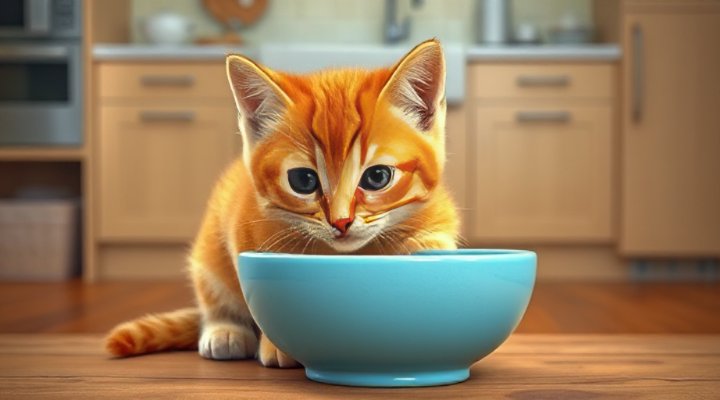
Understanding Kitten Digestive Health Needs
Kittens undergo incredible growth during their first year, and their digestive systems are particularly sensitive during this period. Consequently, they require specialized nutrition that supports both growth and digestive comfort. For instance, their small stomachs need highly digestible proteins and carefully balanced fibers to prevent upset stomachs while providing essential nutrients.
Moreover, according to the FDA’s pet food guidelines, proper nutrition during the growth phase sets the foundation for lifelong health. I remember when my rescue kitten, Whiskers, struggled with digestive issues until we found the right food formula—it was like night and day in terms of his energy and comfort levels.
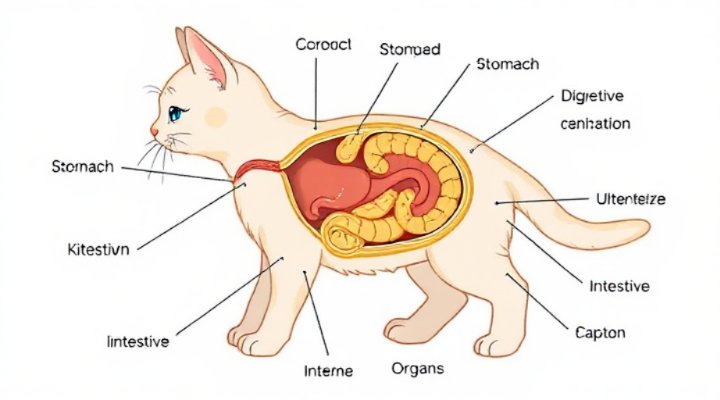
Key Ingredients in Digestive Health Kitten Food
When evaluating the best kitten food for digestive health, certain ingredients stand out for their beneficial properties. Firstly, high-quality animal proteins like chicken, salmon, or turkey provide essential amino acids without overwhelming delicate digestive systems. Secondly, prebiotic fibers such as chicory root or beet pulp support healthy gut bacteria, which is crucial for nutrient absorption.
Essential Nutritional Components
Additionally, omega-3 fatty acids from fish oil support intestinal health while promoting a shiny coat. Likewise, easily digestible carbohydrates like sweet potatoes or brown rice provide energy without causing digestive distress. Most importantly, the inclusion of probiotics helps maintain balanced gut flora, something I’ve found particularly helpful for kittens transitioning to solid food.
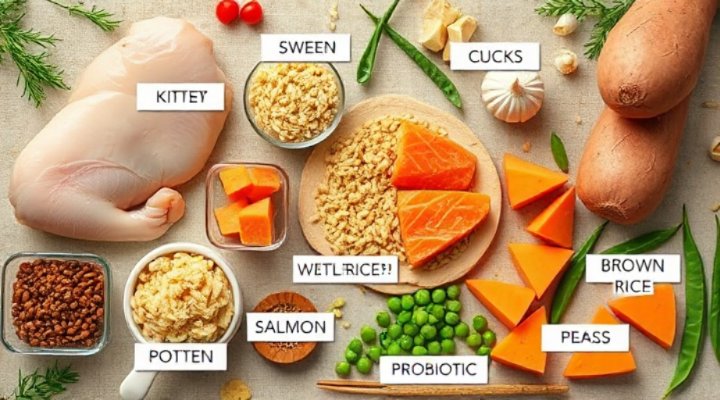
Top Recommended Kitten Foods for Digestive Support
After extensive research and personal experience, several brands consistently rank as the best kitten food for digestive health. Royal Canin Mother & Babycat, for example, features ultra-digestible proteins and prebiotics specifically formulated for sensitive kitten stomachs. Similarly, Hill’s Science Diet Kitten Healthy Development provides balanced nutrition with natural fibers for digestive care.
Furthermore, Purina Pro Plan Kitten Chicken & Rice formula includes live probiotics and high-quality protein. Meanwhile, Blue Buffalo Wilderness Kitten Grain-Free offers a natural approach with digestive health support. As the Fresh Cat Food Complete Guide explains, fresh food options can also provide excellent digestive support when properly formulated.
Transitioning to New Kitten Food
Transitioning your kitten to a new digestive health food requires patience and careful planning. Firstly, always mix the new food gradually with the current food over 7-10 days. Subsequently, monitor your kitten’s stool consistency and energy levels closely during this period. Importantly, sudden changes can disrupt digestive balance, so gradual introduction is key.
I learned this lesson when switching Whiskers to a new formula too quickly—let’s just say it wasn’t pleasant for either of us! The transition guide on our site offers detailed steps to make this process smooth and stress-free for both you and your kitten.
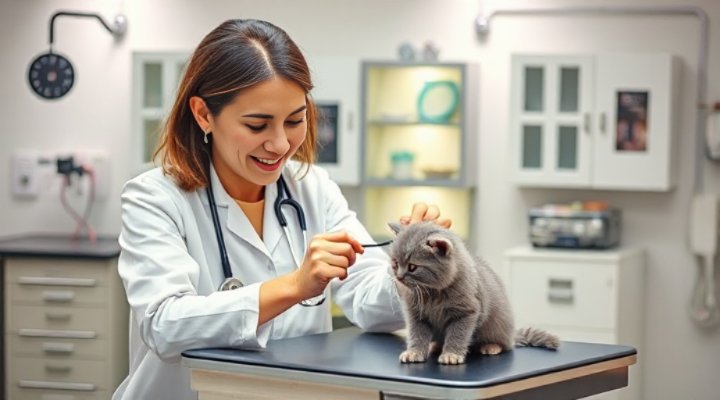
Common Digestive Issues in Kittens
Understanding common digestive problems helps in selecting the appropriate best kitten food for digestive health. Diarrhea, for instance, often indicates food intolerance or improper nutrient balance. Conversely, constipation might suggest insufficient fiber or hydration. Additionally, vomiting after meals could signal eating too quickly or ingredient sensitivity.
When to Consult Your Veterinarian
While proper nutrition solves many digestive issues, some situations require professional attention. Persistent diarrhea lasting more than 24 hours, blood in stool, or significant weight loss warrant immediate veterinary consultation. Likewise, if your kitten shows signs of pain or discomfort during elimination, professional assessment is crucial. The AVMA nutrition guidelines provide excellent resources for understanding when to seek help.
Nutritional Analysis of Top Digestive Health Foods
Analyzing the nutritional content of various kitten digestive health foods reveals important patterns. Premium options typically feature protein levels between 35-45%, fat content around 18-22%, and fiber between 2-4%. Moreover, they avoid artificial preservatives, colors, and fillers that can irritate sensitive digestive systems.
Furthermore, the best formulas include specific digestive supplements like MOS (Mannan Oligosaccharides) for gut health support. Additionally, they maintain optimal calcium-phosphorus ratios for bone development without compromising digestive comfort. As highlighted in our indoor cat nutrition guide, even indoor kittens benefit from specialized digestive support.
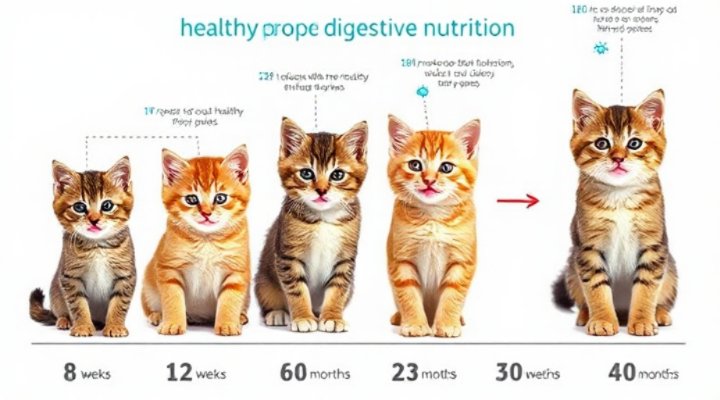
Feeding Guidelines for Optimal Digestive Health
Proper feeding practices complement the benefits of the best kitten food for digestive health. Firstly, establish consistent feeding times to regulate digestive rhythms. Secondly, provide fresh water always, as hydration significantly impacts digestive function. Thirdly, avoid overfeeding, which can overwhelm developing digestive systems.
Portion Control and Frequency
Young kittens under 6 months typically require 3-4 small meals daily, gradually reducing to 2-3 meals as they mature. Importantly, follow package guidelines based on weight and age, adjusting as needed for your kitten’s individual metabolism. During growth spurts, you might notice increased appetite—this is normal but should be managed with measured portions rather than free-feeding.
Long-Term Benefits of Proper Digestive Nutrition
Investing in the best kitten food for digestive health pays dividends throughout your cat’s life. Proper early nutrition reduces the likelihood of chronic digestive issues in adulthood. Moreover, it supports stronger immune function, as approximately 70% of immune cells reside in the digestive tract. Additionally, good digestive health contributes to better nutrient absorption, supporting overall development.
In conclusion, selecting the right digestive health food for your kitten requires careful consideration of ingredients, nutritional balance, and your kitten’s individual needs. Remember that what works perfectly for one kitten might need adjustment for another. Therefore, patience and observation are your best tools in this important journey.
Related Keywords: kitten digestive care, sensitive stomach kitten nutrition, probiotic cat food, kitten growth formulas, feline digestive health, kitten food ingredients analysis, digestive support cat nutrition, kitten feeding guidelines
